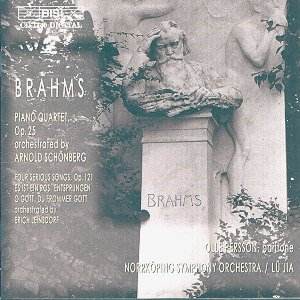Johannes BRAHMS (1833-97)
Piano Quartet No. 1 in G minor, Op. 25 (orch. Schoenberg).
Vier ernste Gesänge, Op. 121 (arr.
Leinsdorf)a.
Chorale Preludes, Op. 122 - No. 8, Es ist ein Ros' entsprungen; No. 7, O
Gott, Du frommer Gott (both arr.
Leinsdorf).
 aOlle Persson
(baritone); Norrköpping Symphony Orchestra/Lu Jia.
aOlle Persson
(baritone); Norrköpping Symphony Orchestra/Lu Jia.
Recorded in the Louis de Geer Hall, Norrköpping, Sweden in April and
May 2000.
 BIS CD1140 [DDD]
[65'01]
BIS CD1140 [DDD]
[65'01]
Crotchet AmazonUK
AmazonUS
Amazon
recommendations

BIS deserve full marks for their imaginative programming, coupling the
Brahms/Schoenberg Piano Quartet with a selection of transcriptions by the
conductor Erich Leinsdorf (1912-1993). The passionate commitment of the
Norrköpping Orchestra under the young Asian conductor Lu Jia is a major
contributory factor to this disc's success, and it is no mean compliment
that the performance of the Brahms/Schoenberg is by no means eclipsed by
Rattle with the CBSO on EMI (originally on HMV EL270169-1, later CDC7 47301-8).
Schoenberg stated of his transcription that he 'wanted once to hear everything'
in this piece (because he thought in the original that the piano had a habit
of swamping the strings). He chose to score for an extended symphony orchestra
in comparison with the one Brahms was wont to use and included tubular bells
and xylophone in his line-up. Once the conceptual leap is made and one is
wrenched from the intimate chamber recital into the full symphony hall, what
emerges is a work of stunning imagination and orchestral mastery. Indeed,
given Schoenberg's allegiance to Brahmsian technique, it is hardly surprising
that what emerges is a tribute from one great composer to another.
Jia makes the first movement sound entirely natural, his tempo flowing at
just the right rate. The Intermezzo is light, if not feather-light, the Andante
emerges as a joyous march and the orchestra demonstrate considerable virtuosity
in the gypsy-tinged finale.
That the Vier ernste Gesänge are symphonically conceived is easily
grasped (in a performance such as that by Hans Hotter and Gerald Moore on
EMI Références CDH7 63198-2 they seem to strain at the seams).
Brahms' piano writing, for example, is frequently referred to as 'orchestral'
(the Piano Sonata Op. 5 is a good example of this): but of course this is
not to imply that orchestration is to automatically add something that was
lacking in the original. Leinsdorf's 1944 orchestration is an interesting
experiment from the pen of a conductor who clearly knew his orchestra inside-out,
so that the dark sonorities sound perfectly in place. Olle Persson, whose
major recording previous to this appears to be a transcription of Schubert's
Die schöne Müllerin for voice and guitar on Caprice CAP21575,
is clearly an intelligent singer who just fails to get beneath the surface
of these songs despite some effective shading of phrases (the third song,
O Tod, wie bitter bist du, for example, is just not despairing enough).
Leinsdorf also took two of the Eleven Chorale Preludes, Op. 122 and
orchestrated them at about the same time as he worked on the above transcription.
They are a delight, from the tender half-lights of Es ist ein Ros'
entsprungen to the wonderful evocation of organ stops by the woodwind
in O Gott, Du frommer Gott..
This is a thought-provoking and enjoyable disc notable for an involving account
of the Brahms/Schoenberg.
Colin Clarke

